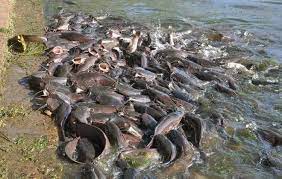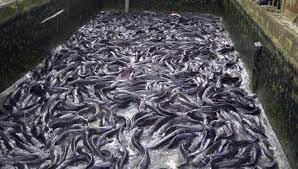North Africa catfish and Nile tilapia are the popular fish that are raised in Uganda today. To learn how to start a fish farming business in Uganda here is a quick summary;
To start a fish farming business in Uganda you need to raise a running capital, locate a farm location for your fish farm, erect ponds, buy your fingerlings and start feeding your fish.
How To Start Fish Farming Business In Uganda [Beginners Guide]

Starting a fish farming business in Uganda here is a step-by-step guide to starting;
Read Also: How To Start Goat Farm Business In Uganda [Beginners Guide]
Step 1: Raise startup capital
Before starting a fish farm, you need to make sure you have the money to do it. This automatically dictates the size of fish ponds, the quantity of fish you start with, the food you buy, and the amount of labor you need to devote to caring for the fish.
Step 2: Locate good farmland
The next step is to locate the farmland you will situate your farm.
The size of land you acquire will dictate the size of your fish farm. To start with, you can start your fish farm with 1 acre of land.
Ensure you site your farm close to an area you can easily monitor as well.
Read Also: Guide To Start A Goat Farming Business In Philippines [Beginners Tips]
Step 3: Erect your pond

The next thing on your fish Farming business plan is to construct your fish pond.
A professional will be required when construction begins, and you can either ask another fish farmer for advice on pond specifications or hire an engineer and a plumber. Both of these options will cost money.
You will need a net to cover the fish pond to keep predators away from the fish, which will cost you about 300,000 shillings.
Note that the pond will require extensive preparation before fish are introduced, and farmers can utilize the following tips to aid in this process.
Drain the water from the pond and allow it to dry for 14 days if you plan to reuse it.
The bottom of the fish pond should be lined with agricultural limestone.
Add organic fertilizer such as rabbit or chicken poop to the pond before you add water.
After the manure has been applied, top off the pond with water that has not been treated with chemicals.
After filling the pond with water, add UREA and DAP as inorganic fertilizers.
Each week, 30 tablespoons of UREA and 15 teaspoons of DAP can be added to a 100-square-meter-squared area of a fish pond.
Read Also: How To Start Poultry Farming Business In Uganda [Beginners Guide]
Step 4: Get A GP tank and Borehole
The next thing is to install a water source and GP tank on your farm.
For water delivery, the GP tank must be connected to the ponds via plumbing. In order to provide the ponds with water, it serves as a water reservoir.
If you plan to create a fish farm, you’ll need a borehole. Borehole water is the safest for fish to drink because tap water that has been chemically treated is not suitable for fish farming.
Toxins and oxygen deprivation can lead to high fish mortality if water flow through plumbing is too low, therefore it’s important to keep this in mind.
Step 5: Read Up About Fish farming
Prior to getting into the business of fish farming, you must first learn about the many species of fish you may raise, the trade-in fish, how you can feed and care for them, and other aspects of the industry. As a risky venture, it is imperative that you receive adequate training to ensure that you do not make any costly errors.
Read Also: How To Start Farming Business In Uganda With No Money [Step By Step]
Step 6: Buy quality fingerlings breeds
If you’re looking for fingerlings, you’ll want to get them from a farm in Uganda that specializes in this type of fish. Tilapia and catfish are the greatest fish species to buy because they are easy to breed and can help your farm in the long run.
Step 7: Formulate good Feeding Formulate for your fish
Floating pellets, dry skin pellets, crumbles, and meals are the most regularly utilized feeds in fish farms. In addition, they must adhere to a set of four rules.
The fish should be fed from the same spot, rather than from various locations around the pond.
The fish should be fed between the hours of 10 a.m. and 4 p.m. when the fish are most active and oxygen levels are at their highest.
In order to produce high-quality fish, the quality of the meals given to the fish must be constant and must be of the best possible quality.
Feeding the fish should be done in a predetermined amount.
Fish Farming Training In Uganda Video:
How Much Does It Cost To Start Fish Farming In Uganda?
To start fish farming in Uganda, it is estimated to cost about 13m of Uganda Shilling.
Is Fish Farming Profitable In Uganda?
In Uganda today, fish farming is one of the most lucrative farm businesses you can venture into.
How Do I Start A Successful Fish Farm?
To start a successful fish farming business in Uganda you need to raise a running capital, locate a farm location for your fish farm, erect ponds, buy your fingerlings and start feeding your fish.
Fish Farming Hatchery In Uganda
To hatch your fish in Uganda, you can search for a fish hatchery that is closer to you on Google, it will bring you to the nearest fish hatchery farm in your vicinity.
Cost Of Starting Fish Farming In Uganda
To start fish farming in Uganda, it is estimated to cost about 13m of Uganda Shilling.
Which Fish Is Most Profitable To Farm?
North Africa catfish and Nile tilapia are the popular fish that are raised in Uganda today.
Conclusion
Raising fish farming is not a joke, it is what it is, it requires time, patience, caring, and many others that we have discussed in this guide. If there is additional information you want us to know, you can drop your comment via the comment section.




Where are you located? Please l’d like to get more information about fish farming business
What other information do you need to know, I’m available to proffer an answer
Between pond and tank system for fish farming which one is better based on the cost analysis. Especially when one has 1 acre of land.
Cost effectiveness, ponds are lesser, tank may be costly, nonetheless for the case of mobility and other reasons we may not go into details with, but in time of cost effectiveness ponds are advisable.
Well elaborated. Am interested in fish farming and require training before I embark. Do you do only ponds or also cage fish farming on the lake ? Thx very much
We do all type of fish farming, nonetheless, all types has their cons and pros
Am mathious kule from kasese I am already owning 2 fish pounds but need to add more 2 . which best seed can u advise me to keep that grow Firster according to your Annalise?
Thank you for your comment, do you mean the best fish feed to make your fish grow faster or best fingerlings that grow faster?
if you are referring to feed, in Uganda, one of the best fish feeds known for promoting faster fish growth is the extruded floating fish feed. This type of feed is highly nutritious and easily digestible for fish, leading to efficient nutrient absorption and accelerated growth rates. It is advisable to consult with local fish feed suppliers or experts in Uganda to identify specific brands or formulations that cater to the nutritional needs of fish species commonly cultivated in the region.
If you are referring to Fingerlings, in Uganda, there are several fish fingerlings known for their faster growth rates. Tilapia species such as Nile tilapia (Oreochromis niloticus) and African catfish (Clarias gariepinus) are popular choices for aquaculture due to their rapid growth and adaptability to local conditions.
Also, selecting genetically improved strains or hybrids of these species, which are specifically bred for faster growth, can further enhance the growth potential of the fingerlings. It is recommended to consult with local fish hatcheries or agricultural agencies for guidance on acquiring fast-growing fish fingerlings in Uganda.
Thank you very for this information. Kindly I would to if I can mix my own fish feed using the locally available Raw materials like maize(carbohydrates) Black soldier fly(protein) and many others to come up with a reasonable quality feed that cannot affect the growth much and can cut my feeding costs.
Thanks
You’re welcome! Mixing your own fish feed using locally available raw materials like maize for carbohydrates and black soldier fly for protein can be a cost-effective approach. However, it’s important to ensure a balanced and nutritious formulation to support optimal fish growth. Consider consulting with a local agricultural expert to create a well-rounded feed recipe that meets the nutritional needs of your fish while minimizing costs.
I too, would like to start a fish pond Kaabong District Karamoja. Can river water sustain fish farming other borehole water?
Definitely it can as it is one of the natural water and natural habitat contents of fishes.
But you have to be sure the water level will be able to sustain your pond during the dry season period, this is most important to avoid loss of your fish stocks.
So it is naturally advisable to get alternative source of water in case of contingencies And perhaps when water overflow their banks.
I will suggest you site your pond not too close to the river because heavy downpour can flood your fishes away.
But it is best advise to locate a murky areas or swamp to erect your ponds, this will go a long way in helping your ponds for water retention.
is a well digger good for fish and where can one go to learn more about fish ponds mostly catfish farming from Uganda.
David thank you for your comments, you may try this feed with your fish for the first two weeks to see the reactions before deciding to fully feed them with well digger.
For the second question on how to learn about catfish in Uganda, what information do you need, as I can be a resource person to guide you through.